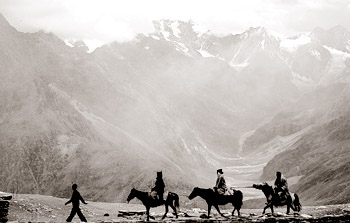Package pilgrims 'destroying the Himalayas'
 HUNDREDS
of thousands of pilgrims flocking to holy sites in the Himalayas are
fouling fragile mountain ecosystems with rubbish, human waste, air
pollution and the deforestation that comes with development. HUNDREDS
of thousands of pilgrims flocking to holy sites in the Himalayas are
fouling fragile mountain ecosystems with rubbish, human waste, air
pollution and the deforestation that comes with development.
Hindus believe the Himalayas are the abode of Lord Shiva, the god of
destruction and regeneration, and devotees trek through treacherous
mountain passes every year to seek Shiva's blessings at various holy
shrines.
But a rise in pilgrimages to these once pristine areas have made the
region a dumping ground for hundreds of tonnes of garbage and human
waste which is contaminating nearby rivers, environmentalists say.
Pollution
 "Increased
pilgrims to these areas is definitely taking its toll on these once
beautiful and clean areas," said Shruti Shukla from WWF India. "Increased
pilgrims to these areas is definitely taking its toll on these once
beautiful and clean areas," said Shruti Shukla from WWF India.
"Plastic rubbish is found littered everywhere, nearby rivers are
filled with human waste and roads have been built bringing in daily
buses packed with pilgrims which is contaminating the air."
The Himalayan mountain range stretches across India, Bhutan, China,
Nepal, Pakistan and Afghanistan and is often referred to as the "Roof of
the World". There are several popular Himalayan pilgrimage sites -
including Amarnath in India's Kashmir region, Gangotri, Kedernath and
Badrinath in the northern state of Uttarakhand, as well as Mount Kailash
and Lake Mansarovar in western Tibet.
Cashing in on India's economic boom and a rapidly growing middle
class, many tour operators are now offering package tours to holy
Himalayan sites.
The commercialisation of pilgrimages, some of which offer helicopter
rides, has brought in hotels, guest houses, restaurants and roads.
Efforts have been made to clean up sites like the Amarnath shrine,
where devotees flock to worship an ice stalagmite which forms every year
and is believed to be a form of Shiva, but local volunteers say more
needs to be done.
"Last year we tried to clean a portion of the track, but our efforts
can only be termed as a drop in the ocean," said Mohammed Ashraf,
president of Jammu and Kashmir Mountaineering Club.
Origin
Environmentalists say Gangotri, the origin of the Ganges river which
Hindus believe to be sacred, has become a shanty town filled with filth
left by around 800,000 pilgrims a year.
Experts say trees are being chopped down for firewood and to make way
for hotels and roads, and human interference is even speeding up the
melting of glaciers.
"It is not just greenhouse gases which are leading to melting
glaciers, but it is also increased human activity and development in the
Himalayas," said Syed Iqbal Hasnain, a glaciologist from New Delhi's
Centre for Policy Research.
"These ecosystems are very, very sensitive to human interference and
over two billion people in the region rely on the rivers which are fed
by these glaciers." |
